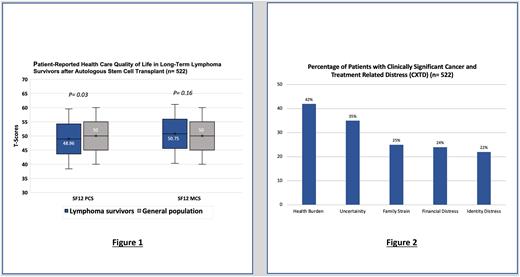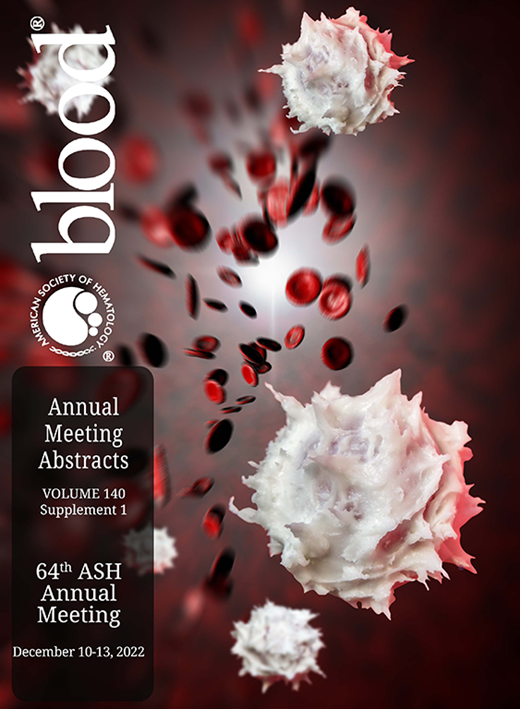Abstract
Background: Autologous hematopoietic cell transplantation (AHCT) recipients with Hodgkin's and Non-Hodgkin's lymphoma (HL and NHL) who survive progression-free for ≥2years can expect a 5-year overall survival rate of 90% (Myers et al, Cancer, 2018). However, patient-reported outcomes (PROs) in long-term lymphoma survivors after AHCT have not been well described. We present secondary analyses from a combined baseline dataset from two multi-center randomized clinical trials of HCT survivorship interventions, enrolling at 18 US transplant centers, including a large cohort of 1-10-year lymphoma AHCT survivors. Our objectives were to describe health-related quality of life (HRQoL) and cancer and treatment-related distress (CTXD), and to examine their associations with available clinical and sociodemographic correlates.
Methods: Cross-sectional data at the time of study enrollment were pooled from two trials: SCP (Survivorship Care Plan; NCT02200133) and INSPIRE (INternet Survivorship Program with Information and REsources; NCT01602211). The SCP study enrolled patients (N=456) who were in a stable remission 1-5 years after transplant and the INSPIRE study enrolled survivors (N=1177) who were 2-10 years post-transplant, between 2003-2014. This analysis was restricted to AHCT recipients with diagnosis of HL or NHL. Our objectives were to describe HRQoL and cancer related distress (CTXD), and to examine their association with available baseline correlates. HRQoL was assessed using SF-12 v2 (12-item short survey form) and described as physical component summary (PCS) and mental component summary (MCS) T-scores (higher scores indicated better functioning). Comparisons between SF-12 scores and age-matched population norm (mean score 50, standard deviation [SD] 10) were analyzed using paired t-tests. Distress was assessed using the CTXD instrument, which reports mean scores from 0 to 3, with higher scores indicating greater distress. Based on prior receiver operating characteristic analysis, CTXD score >1.1 was considered clinically significant. Multivariate linear regression models were performed to evaluate the association of PCS score, MCS score, and CTXD with the following variables: diagnosis (HL vs. NHL), sex, race/ethnicity, number of HCT, use of total body irradiation (TBI) for AHCT, subsequent allogeneic transplant, age at time of enrollment, and time since AHCT.
Results: Of 522 HL and NHL AHCT recipients, 60% were male, 94% were Caucasian, 94 (18%) had HL, 428 (82%) had NHL; 26 (5%) received >1 HCT, including 16 (4%) who received a subsequent allogeneic HCT. 8% patients received TBI-based conditioning regimens. Median age at index AHCT was 55 (range: 17-80) years, and median time from AHCT to study entry was 5 (range: 2-11) years. The mean [±SD] PCS T-score in the study population (48.96 [±10.59]) was slightly lower than the population norm (50 [±10]) (p=0.03). Mean [±SD] MCS T-scores were not significantly different between patients (50.75 [±10.40]) and general population (50 [±10]) (p=0.16) (Figure 1). The mean CTXD score was 0.79 (±0.59), with 135 (26%) patients reporting clinically significant distress (mean score ≥ 1.1). Among CTXD domains, "health burden” and "uncertainty” accounted for the highest burden of clinically significant distress, with 42% and 35% of patients reporting distress in these domains, respectively (Figure 2). On multivariable analysis, older age at study entry was associated with higher MCS score (estimated slope: 1.3 [95% CI: 0.5-2.2]; p=0.002), although there was no association of age with PCS score or CTXD. We did not observe associations of other variables and PCS score, MCS score, or CTXD.
Conclusions: Patients with HL and NHL who are long-term disease-free survivors of AHCT have lower physical HRQoL compared to general population, although the difference is not clinically meaningful. Mental HRQoL in HL and NHL AHCT survivors is similar to general population. Older age is associated with higher mental HRQoL. Approximately a quarter of patients report clinically significant cancer and treatment-related distress. Survivorship programs should continue to screen for, and address concerns regarding HRQoL and distress.
Disclosures
Chakraborty:Adaptive Biotech: Consultancy, Honoraria; Janssen: Consultancy, Honoraria; Sanofi: Consultancy, Honoraria. Hill:BMS: Consultancy, Honoraria, Research Funding; Kite, a Gilead Company: Consultancy, Honoraria, Membership on an entity's Board of Directors or advisory committees, Other: Travel Support, Research Funding; Novartis: Consultancy, Honoraria, Research Funding. Cerny:Amgen: Consultancy, Honoraria, Membership on an entity's Board of Directors or advisory committees; Actinium Pharmaceuticals: Current equity holder in private company; Bluebird Bio/2Seventy: Current equity holder in private company; Dynavax Technologies: Current equity holder in private company; aTyr Pharma: Current equity holder in private company; Gamida Cell: Current equity holder in private company; Miragen Therapeutics: Current equity holder in private company; Mustang Bio: Current equity holder in private company; Novavax: Current equity holder in private company; Ovid Therapeutics: Current equity holder in private company; Sorrento Therapeutics: Current equity holder in private company; TG Therapeutics: Current equity holder in private company; Vaxart: Current equity holder in private company; Veru: Current equity holder in private company; Pfizer: Consultancy, Honoraria, Membership on an entity's Board of Directors or advisory committees; Jazz Pharmazeuticals: Consultancy, Honoraria, Membership on an entity's Board of Directors or advisory committees. Deol:Kite, a Gilead Company: Consultancy; Janssen: Consultancy; Adicet: Consultancy. Jaglowski:Novartis: Research Funding; Kite: Consultancy, Research Funding; Gamida: Consultancy; CRISPR Therapeutics: Consultancy. Jim:Kite Pharma: Research Funding. Khera:Incyte: Consultancy; Optum: Honoraria. McGuirk:Magenta Therapeutics: Consultancy, Honoraria, Research Funding; Novartis: Consultancy, Honoraria; Orca Bio: Research Funding; BMS: Consultancy, Honoraria, Speakers Bureau; Nextar: Consultancy, Honoraria; Sana: Honoraria; Kite, a Gilead Company: Consultancy, Honoraria, Research Funding, Speakers Bureau; Allovir: Consultancy, Honoraria, Research Funding, Speakers Bureau; CRISPR Therapeutics: Consultancy; In8bio, Inc.: Other: IIT Clinical Trial; Juno Therapeutics: Consultancy, Honoraria, Research Funding. Stiff:Bristol Myers Squibb: Research Funding; Incyte: Research Funding; Gilead: Research Funding; Karyopharm: Research Funding; Pfizer: Research Funding; Seagen: Research Funding; Gamida Cell: Research Funding; Amgen: Research Funding; CRISPR Therapeutics: Consultancy; MorphoSys: Consultancy; Macrogenics: Research Funding; Janssen: Research Funding; Kite, a Gilead Company: Research Funding; Cellectar: Research Funding. Holtan:Generon: Consultancy; Ossium: Consultancy; Incyte: Research Funding; Vitrac Therapeutics: Research Funding; CSL Behring: Other: Clinical trial adjudication. Hamilton:Equilium: Membership on an entity's Board of Directors or advisory committees; Nkarta: Membership on an entity's Board of Directors or advisory committees; Syndax: Membership on an entity's Board of Directors or advisory committees; Incyte: Membership on an entity's Board of Directors or advisory committees; Kadmon: Membership on an entity's Board of Directors or advisory committees.
Author notes
Asterisk with author names denotes non-ASH members.


